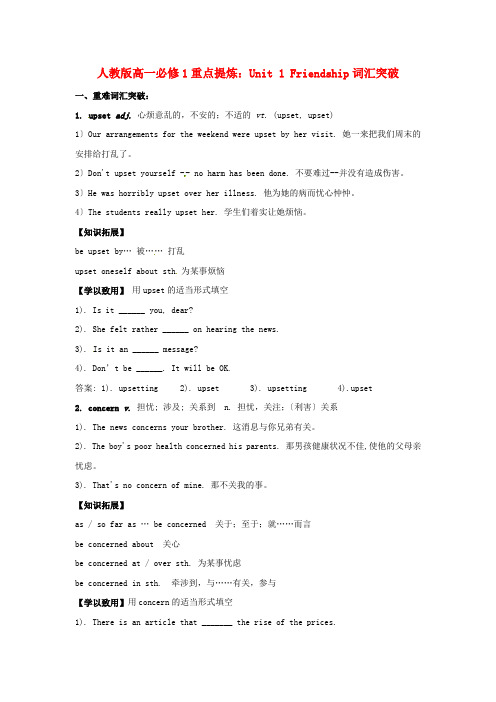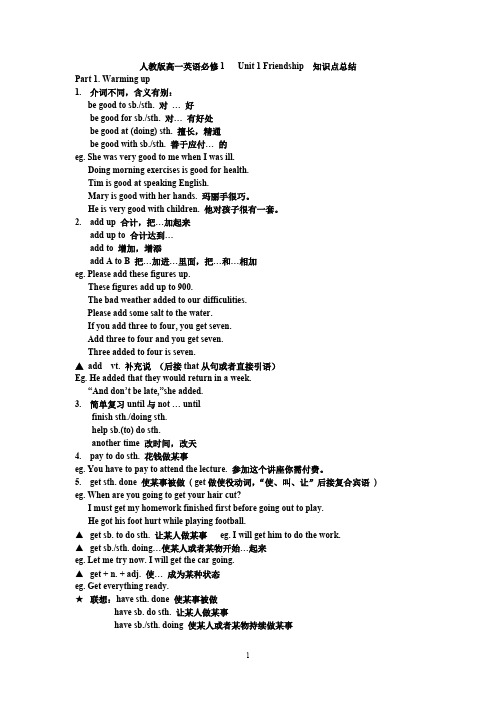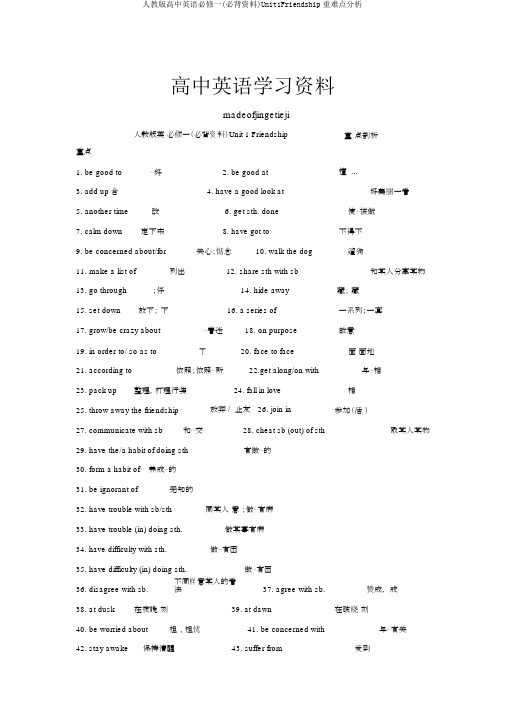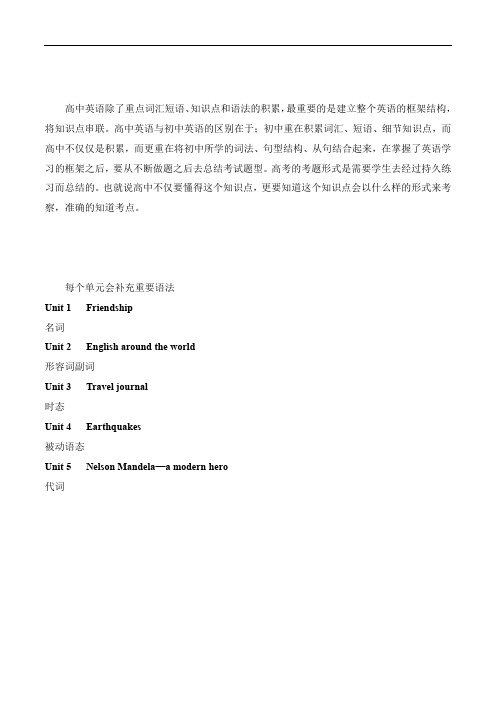人教版高中英语必修一高一重点提炼:Unit1Friendship语法突破(1).docx
Friendship知识点总结

人教版高一英语必修1 Unit 1 Friendship 知识点总结Part 1. Warming upadd up 合计,把…加起来add up to 合计达到…add to 增加,增添add A to B 把…加进…里面,把…和…相加eg. Please add these figures up.These figures add up to 900.The bad weather added to our difficulities.Please add some salt to the water.Three added to four is seven.▲add vt. 补充说(后接that从句或者直接引语)Eg. He added that they would return in a week./ “And don’t be late,”she added.Your friend comes to school very upse t.upset 此处为adj. 做主语补足语,用来补充说明主语的情况。
Eg. He went to bed cold and hungry.▲upset的用法:(1). adj. 心烦意乱的,不安的,不适的(多做表语)She was really upset about losing the money.(2). vt. 使不安,使心烦(upset, upset) The bad news upset the boy’s mother.▲ignore vt. 不理睬,忽视Alice saw Jack coming, but ignored him.▲calm down vt./vi. (使)平静下来,(使)镇定下来eg. The excited girl quickly calmed down. He took a deep breath to calm himself down.▲calm adj. 平静的,镇静的,沉着的eg. Keep calm.After the storm, it became calm again.▲concern (1)vt. (使)担忧,涉及,关系到eg. She concerns herself about her son’s future.The news concerns your brother.▲concern 做动词时,更多情况下用过去分词做表语。
(整理版高中英语)人教高一必修1重点提炼Unit1Friendship词汇突破

人教版高一必修1重点提炼:Unit 1 Friendship词汇突破一、重难词汇突破:1. upset adj.心烦意乱的,不安的;不适的vt. (upset, upset)1〕Our arrangements for the weekend were upset by her visit. 她一来把我们周末的安排给打乱了。
2〕Don't upset yourself -- no harm has been done. 不要难过--并没有造成伤害。
3〕He was horribly upset over her illness. 他为她的病而忧心忡忡。
4〕The students really upset her. 学生们着实让她烦恼。
【知识拓展】be upset by… 被…… 打乱upset oneself about sth为某事烦恼【学以致用】用upset的适当形式填空1). Is it ______ you, dear?2). She felt rather ______ on hearing the news.3). Is it an ______ message?4). Don’t be ______. It will be OK.答案: 1). upsetting 2). upset 3). upsetting 4).upset2. concern v.担忧; 涉及; 关系到 n. 担忧,关注;〔利害〕关系1). The news concerns your brother. 这消息与你兄弟有关。
2). The boy's poor health concerned his parents. 那男孩健康状况不佳,使他的父母亲忧虑。
3). That's no concern of mine. 那不关我的事。
【知识拓展】as / so far as … be concerned 关于;至于;就……而言be concerned about 关心be concerned at / over sth. 为某事忧虑be concerned in sth. 牵涉到,与……有关,参与【学以致用】用concern的适当形式填空1). There is an article that _______ the rise of the prices.2). The children are rather _____ about their mother’s health.3). Officials should ______ themselves _______ public affairs.答案: 1). concerns 2). concerned 3). concern … with3. settle vt. 安家;定居;停留 vt. 使定居,安家;解决1). He settled his child in a corner of the compartment. 他把孩子安排在车厢的一个角落里。
人教版高一英语必修1---Unit-1-Friendship--知识点总结(word文档物超所值)

人教版高一英语必修1 Unit 1 Friendship 知识点总结Part 1. Warming up1.介词不同,含义有别:be good to sb./sth. 对… 好be good for sb./sth. 对… 有好处be good at (doing) sth. 擅长,精通be good with sb./sth. 善于应付… 的eg. She was very good to me when I was ill.Doing morning exercises is good for health.Tim is good at speaking English.Mary is good with her hands. 玛丽手很巧。
He is very good with children. 他对孩子很有一套。
2.add up 合计,把…加起来add up to 合计达到…add to 增加,增添add A to B 把…加进…里面,把…和…相加eg. Please add these figures up.These figures add up to 900.The bad weather added to our difficulities.Please add some salt to the water.If you add three to four, you get seven.Add three to four and you get seven.Three added to four is seven.▲add vt. 补充说(后接that从句或者直接引语)Eg. He added that they would return in a week.“And don’t be late,”she added.3.简单复习until与not … untilfinish sth./doing sth.help sb.(to) do sth.another time 改时间,改天4.pay to do sth. 花钱做某事eg. You have to pay to attend the lecture. 参加这个讲座你需付费。
人教版高中英语必修一(必背材料)Unit1Friendship重难点解析

高中英语学习资料madeofjingetieji人教版英必修一(必背资料)Unit 1 Friendship重点剖析重点1. be good to⋯好2. be good at擅 ...3. add up合4. have a good look at好美丽一看5. another time改6. get sth. done使⋯被做7. calm down定下来8. have got to不得不9. be concerned about/for关心;惦念10. walk the dog遛狗11. make a list of列出12. share sth with sb和某人分享某物13. go through;仔14. hide away藏;藏15. set down放下;下16. a series of一系列;一套17. grow/be crazy about⋯着迷18. on purpose故意19. in order to/ so as to了20. face to face面面地21. according to依照;依照⋯所22.get along/on with与⋯相23. pack up整理,打理行装24. fall in love相25. throw away the friendship放弃 / 止友 26. join in参加(活)27. communicate with sb和⋯交28. cheat sb (out) of sth取某人某物29. have the/a habit of doing sth有做⋯的30. form a habit of⋯养成⋯的31. be ignorant of无知的32. have trouble with sb/sth同某人意;做⋯有麻33. have trouble (in) doing sth.做某事有麻34. have difficulty with sth.做⋯有困35. have difficulty (in) doing sth.做⋯有困36. disagree with sb.不同样意某人的看法37. agree with sb.赞成,成38. at dusk在夜晚刻39. at dawn在破晓刻40. be worried about担、担忧41. be concerned with与⋯有关42. stay awake保持清醒43. suffer from受到44. recover from从⋯中恢复、康复45. settle down定居⋯ 倦、47.be tired from/ with因⋯而倦、疲倦48.no longer/ not⋯ any longer不再49.too much/many太多50.tie up 、系、拴51.take no notice of不注意52. by accident/chance有时的53.make friends with与某人交朋友理、付55.share joys and sorrows休戚与共56.two years and a half / two and a half years两年半ugh at sb.讽刺某人58.the night before前天夜晚59.on the highway在高速路上60.receive a letter from sb.收到某人的来信61.write to sb.某人写信62.swap sth. with sb.与某人交某物63.with the light on开着灯64.with so many clothes on穿着么多衣服65.take the final exam行期末考 66.be grateful to sb. for sth.因⋯而感谢某人67.one by one/one after another一个接一个 68. go outdoors到室外69.ask sb. for advice向某人求建采⋯的建重点句子1. I wonder if ⋯我想知道可否⋯ .2. It ’s because ⋯是因⋯ . 此从句中because 不能够用 since 或 as 代替3. I haven ’t been able to be outdoors for so long that I’ve grown so crazy about everything to do with nature.我已许久不能够去外,所以我得自然界的所有西都很感趣。
Unit 1 Friendship高一英语上学期单元易考点精讲讲练+语法专题复习(人教版必修一)

高中英语除了重点词汇短语、知识点和语法的积累,最重要的是建立整个英语的框架结构,将知识点串联。
高中英语与初中英语的区别在于;初中重在积累词汇、短语、细节知识点,而高中不仅仅是积累,而更重在将初中所学的词法、句型结构、从句结合起来,在掌握了英语学习的框架之后,要从不断做题之后去总结考试题型。
高考的考题形式是需要学生去经过持久练习而总结的。
也就说高中不仅要懂得这个知识点,更要知道这个知识点会以什么样的形式来考察,准确的知道考点。
每个单元会补充重要语法Unit 1 Friendship名词Unit 2 English around the world形容词副词Unit 3 Travel journal时态Unit 4 Earthquakes被动语态Unit 5 Nelson Mandela—a modern hero代词Unit 1 Friendship重点词汇短语add up、until 、upset、ignore、concerned、calm、suffer、go through、get along with重要语法强调句型、before引导的时间状语从句Section I warming up重点讲解I Add up your score and see how many points you get.把你的分数加起来,看看得分有多少。
add up = add together 加起来,合计Add up these numbers and write down your answer.Cao Chong wrote down the weight of each stone and then _____________ all the weights.曹冲击下了每一块石头的重量,然后合计了所有石头的重量。
add 构成的短语归纳:1.add … to … 加……, 往... 添加…If you add 5 to 3, you’ll get 8. Would you like to ad d anything to what I have said. 2.add to 增加,增添(其宾语多为困难、欢乐、麻烦等抽象名词)His illness added to the family’s trouble.3.add up to 合计达,总共有… His whole income adds up to $ 10 000 a month.即时操练:1.Please __________ the numbers and I’m sure they will ______________ more than 1000.2.The bad weather ________ the difficulty of building the road.3.The soup tastes a little salty, please _______ some water to it.A. takeB. placeC. addD. layII … but your friend can’t go until he/ she finishes cleaning the bicycle.但你的朋友直到清洗完自行车才能走。
人教版高中英语必修一Unit1Friendship知识点汇总综述

1一、佳句背诵1. Add up ( 增加 )your score and see how many points you can get.(P1)2. Your friend comes to school very upset. The bell rings so you need to go to class. You will ignore the bell and gosomewhere quiet to calm your friend down.(使某人沉静下来). / tell your friend that you’ ve got to(不得不) go to class./tell your friend that you are concerned about ( 关怀,牵挂 ) him/her but you have to go to class. You two will meet afterclass and talk then. (P1)3.Your friend has gone on holiday ( 度假 ) and asked you to take care of(照料) his /her dog. While walking the dog(遛狗), you were careless and it got loose and was hit by a car.(P1)4.Or are you afraid that your friend would laugh at (嘲讽 ) you, or just can’ t understand whatare yougoing through? (经历) (P2)5.She and her family hid away ( 潜藏 ) for nearly twenty-five months before they were discovered.( P2)6.I don ’ t wantsettleto down ( 写下 ) a series of (一系列)facts in a diary as most people do, but I want this diary itselfto be my friend, and I shall call my friend Kitty.(P2)7.For example, when it was so warm, I stayed awake on purpose (成心 ) until half past eleven one evening in order to(目的是) have a good look at the moon for once by myself.(P2)8.Another time five months ago, I happened to ( 刚巧 ) be upstairs one evening when the window was open It w as.the first time in a year and a half that I ’ d seen the night(面对face 面 )to(P2)face9.He used to work ( 过去常做某事 ) outdoors even in the middle of winter.(P4)10.I’ m getting along well with ( 与某人相处友善 )a boy in my class. (P6)11.Join in ( 加入 ) people’ s discussionTry. to make friends with(与某人交朋友 ) one or two classmates. (P7)12.Mr. Jones lives alone ( 独自) and often feels lonely.(孤单)We communicate with each other(互相沟通 )by Internet /through the Internet. (P42)13.A friend in need is a friend indeed. (难兄难弟才是真实的朋友 )(P46)14.A friend to all is a friend to none. (滥交者无友 )(P46)15.With clothes the new are the best; with friends the old are the best. (衣服是新的好;朋友是旧的好 )(P46)二、单词分析1 、 survey n. 检查,概括; v. 丈量,检查;A recent survey showed most of those questioned were for the plan. 近来的民心测试显示大部分检核对象赞同这项计划。
高中英语 unit1 friendship语法突破习题重点提炼 新人教版必修1
人教版高一必修1重点提炼:Unit 1 Friendship语法突破习题【应用落实】1.The physics teacher once said that we first _____the lightning followed bythunders becauseLight ______faster than sound.A. see; travelledB. saw; travelledC. saw; travelsD. see; travels2.Granny Lan once told us she ______a lot during the World II,______her husbandand children.A. had suffered; lostB. suffered; losingC. had suffered; losingD. had suffered; had lost3.The witness said to the policeman that he _______for a bus when the trafficaccident happened.A. had been waitingB. was waitingC. waitedD. is waiting4.—Tonna said she _____to see us _____.—Then we'd better not go out today.A. will come; that dayB. would go; todayC. would come; todayD. will go; thatday5.Tom told his aunt that he _________what he was doing during the time when hewas in the country.A.had just asked B.just askedC.has just asked D.had just been asked6.——“Do you know where she lives?” he asked.一He asked me_________.A.if you know where she lives B.whether you knew where she livedC.if I knew where she lived D.whether I know where she lived7.——The teacher asked Jenny,“Where did yo u put the basketball yesterday?"——The teacher asked Jenny_________.A.where she had put the basketball the day beforeB.where she put the basketball yesterdayC.where she put the basketball the day beforeD.where you had put the basketball the day before8.He asked_________for the computer.A.did I pay how much B.I paid how muchC.how much did I pay D.how much I paid9.The nurse told the children that the sun in the east.A.risen B.rose C.rises D.rising10.The little girl to1d him that she had watched the wonderful football match_________.A.today B.tomorrow C.the month before D.the next month11.The teacher told the students that there_________ a meeting at three o'c1oc k.A.were going to have B.is going to be C.will be D.was going to be12.After the examination,my teacher told me that failure _________the mother of success.A.was B.is C.be D.been13.He asked me when _________ meet Tom the next day.A.I would B.would I C.you will D.would you14.Mom called me yesterday,asking me _________I was getting along well with my English study this term.A.when B.how C.whether D.why【参考答案】1. 【解析】答案C 。
高中英语必修1(人教新课标)unit1friendship知识点总结
高中英语必修1(人教新课标)Unit 1 Friendship知识点总结一、重点词汇1. survey 调查·原文再现Do the following survey.做下面的调查。
·基本用法n. 民意调查,民意测验,常用于结构make a survey of sth,表示“调查某事物”。
(名词复数:surveys )The reporter made a survey of river pollution.记者对河流污染进行了调查。
·知识拓展----其他词性v. survey 查看,审视,眺望(风景等)The next morning we surveyed the damage caused by the fire.次日早晨我们查看了火灾的损失情况。
2. add v.增加,加·原文再现Add up your score and see how many points you get.把你的得分加起来看看有多少。
·基本用法add vt./vi. 增加,增添”。
If you add 4 to 5, you get 9.四加五等于九。
·知识拓展词义辨析 add to/ add....to.../add up(together) /add up to(1). add to指的是“增添,增加,增进”。
The bad weather added to our difficulties.恶劣的天气增加了我们的困难。
(2). add... to...指的是“把……加到……上”, 是把前一项加到后一项之后或之中。
If you want to eat hot things, you can add red pepper to them.如果你想吃辣的,你可以加些红辣椒。
(3). add up 指的是“加起来”。
Add your scores up and you will see who won.把你们的分数相加,看看谁赢了。
人教版高一英语必修一Unit1 Friendship句子语法
人教版高一英语必修一Unit1 Friendship句子语法1、直接引语和间接引语的用法1?陈述句直接引语如果是陈述句?变为间接引语时用连词that (that在口语中常省略) 引导?其人称、时态、时间状语、地点状语和指示代词作相应的变化。
若引述动词用的是say to sb. 通常改为tell sb?若直接引语是两个并列的陈述句?要注意在第二个宾语从句前加连词that?引导第一个宾语从句的that可省?但引导第二个从句的that通常不省。
1) “I hope you can come,” he said to me. rarr;He told me that he hoped I could go. 2) He said, “I am tired and I want to have a rest.”rarr;He said that he was tired and that he wanted to have a rest.2?一般疑问句直接引语为一般疑问句时?变为间接引语时用if 或 whether 引导?语序为陈述句语序?若谓语动词后没有间接宾语?加上间接宾语me, him, her, us等。
1) “Have you been there?” he asked. rarr;He asked me if / whether I had been there. 2) He asked,“Are you interested in English?”rarr;He asked me if I was interested in English. 3?特殊疑问句直接引语为特殊疑问句时?变为间接引语用疑问词作为连词?构成宾语从句?语序为陈述语序?若直接引语的动词为say?改为ask。
1) He said, “Jim, when is the next train?” rarr;He asked Jim when the next train was.2) He asked me, “Why did you do it?”rarr; He asked me why I had done it. hearts;直接引语变间接引语的五点变化1. 时态的变化。
高中英语Unit1Friendship单元重点小结课件新人教版必修1
解决;定居点→ settler
n.定居者
10. suffer vt.& vi. 遭受;忍受;经历
11.recover vi.& vt. 痊愈;恢复;重新获得→ recovery
n.恢
复;痊愈
12.exactly adv.确实如此;正是;确切地→ exact adj.精确的;确
切的
13.disagree vi. 不同意→ disagreement n.不同意;反对→
不得不;必须
4. be concerned about
关心;挂念
5.
walk the dog
遛狗
6.
go through
经历;经受
7.
set down
记下;放下;登记
8.
a series of
一连串的;一系列;一套
9.
on purpose
有意
10. in order to
为了……
11.
at dusk
我不知道这是不是因为我长久无法出门的缘故,我变得对一切与大
自然有关的事物都无比狂热。
3....it
was the first time
in a year and a
half that I’d seen the night face to face ....
……这是我一年半以来第一次目睹夜晚……
重点单词 重点短语 重点句型 重点语法 交际功能
Direct Speech and Indirect Speech(Ⅰ):statements and questions 直接引语和间接引语(Ⅰ):陈说句和疑问句 陈说句 1.“I don’t want to set down a series of facts in a diary,” said Anne. →Anne said that she didn’t want to set down a series of
- 1、下载文档前请自行甄别文档内容的完整性,平台不提供额外的编辑、内容补充、找答案等附加服务。
- 2、"仅部分预览"的文档,不可在线预览部分如存在完整性等问题,可反馈申请退款(可完整预览的文档不适用该条件!)。
- 3、如文档侵犯您的权益,请联系客服反馈,我们会尽快为您处理(人工客服工作时间:9:00-18:30)。
高中英语学习材料***鼎尚图文理制作***人教版高一必修1重点提炼:Unit 1 Friendship语法突破(1)间接引语引用,是一种修辞方法。
引用可以一字不改地将别人的话加以引用或复数出来,这叫做直接引语(direct speech);或用自己的话转述别人的话,叫做间接引语(indirect speech)。
一般地讲直接引语须放在引号内;间接引语不用引号,而用宾语从句来表达。
如:He said, "I am a doctor".他说:“我是医生。
”(引号内的内容是直接引语)He said that he was a doctor.他说他是医生。
(句中的宾语从句是间接引语)直接引语变间接引语的一般规则1.时态变化直接引语变间接引语时,时态变化规则如下表:直接引语间接引语一般现在时一般现在时一般过去时现在进行时现在进行时过去进行时现在完成时现在完成时过去完成时现在完成进行时现在完成进行时过去完成进行时一般过去时一般过去时过去完成时进去完成时进去完成时过去完成时一般将来时一般将来时过去将来时情态动词can/may could/might如:①The girl said, "I'm sorry for being late for class." →The girl said that she was sorry for being late for class.那姑娘说对不起她上课迟到了。
②My mother said to me, "Your classmate is waiting for you in the sitting room." →My mother told me that my classmate was waiting for me in the sitting room.我母亲告诉我,我的同学正在客厅等我。
③She said, "I have seen the film Titanic." →She said that she had seen the film Titanic.她说她看过了电影《泰坦尼克号》。
④Li Hua said to me," Your parents have been looking for you." →Li Hua told me that my parents had been looking for me.李华告诉我,我的父母正在找我。
⑤He said, "I made some spelling mistakes yesterday." →He said that he had made some spelling mistakes the day before. 他说他前一天出了一些拼写错误。
⑥The student said," I had learnt about 5,000 English words by the end of last year." →The student said that he had learnt about 5,000 English words by the end of the year before.那个学生说到去年年底他已经学了5,000个单词。
⑦He asked me, "What were you doing at that time?" →He asked me what I was doing at that time.他问我那时我在干什么?⑧She said, "I will go there this afternoon." →She said (that) she would go there that afternoon,她说她那天下午将去那里。
2.人称变化人称变化要根据说话者、听者或第三者的相互关系,作出相应和变化。
如:①He said to me. "I have left my book in your room." →He told me that he had left his book in my room.他告诉我他把书落在我的房间了。
②The teacher said, "I’m glad to be with you.→The teacher said that he was glad to be with us.老师说他很高兴和我们在一起。
3.其它变化其它变化包括指示代词、时间和地点的词以及表示方向的动词变化。
详见下表:直接引语间接引语指示代词this these表示时间that thosenow thentoday, tonight that day, that night tomorrow the next(following) day this week(month...) that week(month...) yesterday the day beforelast week(month...) the week(month...)beforethe day before yesterday two days beforethe day after tomorrow in two days'timethree days ago three days beforenext week(month...) thenext(following)week(month...) 方向动词bring takecome go表示地点here there如:①He said, "I will come here again tonight." →He said that he would go there again that night.他说他今天晚上再去那儿。
②She said, "I arrived yesterday morning." →She said that she (had) arrived the morning before.他说他昨天早晨到达的。
4.各种句式的直接引语变间接引语。
a.直接引语为陈述句。
直接引语为陈述句时,间接引语用that引导的宾语从句。
如:Tom said, "I've reviewed my lessons." →Tom said that he had reviewed his lessons. 汤姆说他已经复习了他的功课。
主句中的"say to sb."常须改为"tell sb."如:She said to me, "I'm studying Japanese these days." →She told me(that) she was studying Japanese those days. 好告诉我好这几天正在学日语。
b.直接引语为一般疑问句直接引语是一般问句时,间接引语用whether或if 引导的宾语从句。
如:Mr. Green asked," Are you preparing for it?" →Mr. Green asked whether (if) we were preparing for it. 格林先生问我们是否正在准备。
如果问句是表示建议,可用动词suggest或advise加宾语从句或适当结构来完成。
如:"Shall we meet at the theatre?" he said →He suggested that we should meet at the theatre.(=He suggested our meeting at the theatre.他建议我们在电影院见面。
c.直接引语为特殊问句直接引语是特殊问句时,间接引语为原连接代词(副词)引导的宾语从句。
如:①He asked, "what size dress do you wear?" →He asked what size dress I (you) wore .他问我穿什么型号的。
②He asked, "which one do you like best?" →He asked which one you(I)liked best.他问我最喜欢哪一个。
d.直接引语为选择问句直接引语是选择问句时,间接引语为"whether...or"引导的宾语从句。
如:He asked me, "Will you go abroad or stay in Beijing?" →He asked me whether I would go abroad or stay in Beijing.他问我是出国呢还是呆在北京。
e.直接引语为反意问句直接引语是反意问句时,间接引语为whether或if引导的宾语从句。
如:He asked, "You have succeeded, haven't you?" →He asked us if we had succeeded. 他问我们是否已成功。
f.直接引语为感叹句直接引语为感叹句时,间接引语可用what或how引导的宾语从句,也可以用that引导的宾语从句,有时还可用其它适当的动词来转述。
如:①"How fast he runs!" he said, →He said how fast he ran.(=He said that he ran very fast.) 他说他跑得多么快。
②She said, "Happy New Year! "→She wished me a happy New Year.她祝愿我新年愉快。
